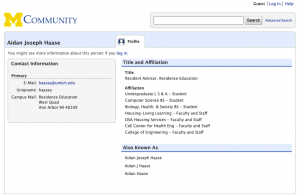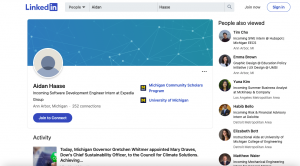Difference between revisions of "Aidan Haase"
| Line 9: | Line 9: | ||
===Modified Google Search=== | ===Modified Google Search=== | ||
| − | |||
Doing a Google search with my current institution after my name yields more current, representative information of my current self. On the first page of search results, one can see links to my involvement in Michigan Community Scholars Program, my involvement in Center for Healthcare Engineering and Patient Safety, and my MCommunity Profile which, after finding my name, lists a slew of academic and employment involvements. Additionally, every link on the first page of google in this search applied directly to me instead of others with the same name. It reinforces and better constructs the academic and extracurricular components of my online persona as the current involvements are more readily available. This search therefore gives a better sense of who I currently am and what I am interested in than a google search of just my name alone, yet still has a lot of gaps. | Doing a Google search with my current institution after my name yields more current, representative information of my current self. On the first page of search results, one can see links to my involvement in Michigan Community Scholars Program, my involvement in Center for Healthcare Engineering and Patient Safety, and my MCommunity Profile which, after finding my name, lists a slew of academic and employment involvements. Additionally, every link on the first page of google in this search applied directly to me instead of others with the same name. It reinforces and better constructs the academic and extracurricular components of my online persona as the current involvements are more readily available. This search therefore gives a better sense of who I currently am and what I am interested in than a google search of just my name alone, yet still has a lot of gaps. | ||
| + | [[File:haase2.png|thumb|LinkedIn profile showing posts I liked and people that I know.]] | ||
This google search creates a more accurate online identity and is more stable. Everytime a big academic, employment, or research-related event occurs in my life I update my LinkedIn. In my eyes, it is synonymous with the professional resume of my life. It embodies how I portray myself to future employers, yet instead of being restricted to a single page, contains everything that I have had to cut from my current resume. This stabilizes my embodiment online in terms of professionalism and is consistently updated. | This google search creates a more accurate online identity and is more stable. Everytime a big academic, employment, or research-related event occurs in my life I update my LinkedIn. In my eyes, it is synonymous with the professional resume of my life. It embodies how I portray myself to future employers, yet instead of being restricted to a single page, contains everything that I have had to cut from my current resume. This stabilizes my embodiment online in terms of professionalism and is consistently updated. | ||
Revision as of 19:03, 18 February 2021
The image constructed after searching “Aidan Haase” is quite different from my actual self. Although I, like many others my age, am connected to the internet 24/7 I find that what is on the internet is rather incomplete in representing my self-identity. I don’t necessarily share everything about myself online but I also don’t place much importance in privacy, as I have all my social media accounts public -- so what if someone not following me sees a post I made, I hardly post anyway. After extensive googling (using Google Chrome Incognito and other search engines) to construct my online identity, it is clear that this is representative of my academic and extracurricular persona but incomplete in terms of my passions and personality.
Contents
Defining My Online Data Identity
Google Search "Aidan Haase" and Social Media
Doing a quick google search of “Aidan Haase” yields a first page of results that includes my LinkedIn, Instagram, and Facebook. Roughly half of the results on the first page were for other people with the same name. Most of the information on the social media returned is hidden unless you log in and are friends with me, with images being an exception. Of these three, LinkedIn is the most revealing of my personal information as it contains more than just pictures with captions; it has all of my recent employment, academic, and extracurricular involvements relative to job and internship recruitment. If you continue to the second page of search results, you will find links to student organizations I’m in, my involvement as a Resident Advisor, and high school sports records for track and tennis. Every track meet and tennis match from high school was either mentioned in the news or logged on stats websites such as athletic.net, so there is extensive information searchable for my sports history. If you go into the 3rd page and beyond, one will begin to see obituaries of close relatives and links to other family members in the news.
Looking on the relevant images that google returns, only 4 are of myself and all from high school sports. Constructing an image of my persona using the search results of only my name would be difficult and incomplete. The current involvements found on LinkedIn and in some deeper search result pages would be representative of my academic persona, but none of my interests are obvious. Much of the information on the social media platforms is outdated given my posting frequency and it would similarly be incorrect to assume my sports interests are consistent with high school.
Modified Google Search
Doing a Google search with my current institution after my name yields more current, representative information of my current self. On the first page of search results, one can see links to my involvement in Michigan Community Scholars Program, my involvement in Center for Healthcare Engineering and Patient Safety, and my MCommunity Profile which, after finding my name, lists a slew of academic and employment involvements. Additionally, every link on the first page of google in this search applied directly to me instead of others with the same name. It reinforces and better constructs the academic and extracurricular components of my online persona as the current involvements are more readily available. This search therefore gives a better sense of who I currently am and what I am interested in than a google search of just my name alone, yet still has a lot of gaps.
This google search creates a more accurate online identity and is more stable. Everytime a big academic, employment, or research-related event occurs in my life I update my LinkedIn. In my eyes, it is synonymous with the professional resume of my life. It embodies how I portray myself to future employers, yet instead of being restricted to a single page, contains everything that I have had to cut from my current resume. This stabilizes my embodiment online in terms of professionalism and is consistently updated.
A Note on Twitter
Given that all of my social media accounts are public, I usually take care to post things that are representative of myself and not too private of information. I have recently taken down my Twitter account, which is where I would retweet more political topics. If I had done this detailed search of myself months ago, the online data identity I would be able to construct for myself would better reflect different viewpoints that I have. With my ~5 years on twitter, I had retweeted countless tweets pertaining to social movements, left politicians, sports events, and hikes I wanted to do in the future. Had this information been accessible today, my argument would be different -- including this information, I would say that my online identity is representative of my self-identity. It is respectable and surprising for Twitter to honor their policy and delete the information associated with an account once it is deactivated (doing countless searches for specific tweets I remember creating yielded no results). As the saying normally goes, once it is on the internet it is up forever, this case is reliant on other users saving my information rather than Twitter itself.
Me vs. My Online Data Identity
Authenticity: The Disparity
Although these two google searches give way to an online persona that proves rather accurate and stable, it is quite inauthentic. Much of my online data identity consists of information posted by others via news articles, tags, or mentions in posts. Much of the statistical facts regarding my participation in sports is also readily available. The majority of these posts and articles on myself all have a common thread in that they demonstrate the highlights of my life. The posts I make and that I am tagged in are of memorable times and times that I want everyone to see. The articles with my name are all of sport or academic successes. The recruiting platforms such as LinkedIn are where I try to appear professional, experienced, and qualified to recruiters. Aggregating this information, it is clear that today I am much more that the image this online identity creates. There are many interests, passions, and involvements that represent who I am that are not evident in this online identity -- passions such as civic engagement, research, plants, and personal life goals to name a few. Many of the barriers and challenges that I have overcome, barriers that have come to define my identity, are left out of the digital identity.
Implications
Awareness of my constructed online data identity has many implications and limitations. The identity constructed may hold greater value on things that are out of date, such as high school events in the case of the first search query described. This identity also does not demonstrate authenticity of my personality as it is the more professional side of my persona. This identity is what potential future employers would see if they wanted to get an idea of who I am before an interview, for example. Yes, this does contain the highlights of my academic and professional life, but it does not encompass all of me. How my friends and family would describe me is different than how these potential employers would describe me. It is important to understand that this may be the case for many other individuals as well and to recognize the discrepancies that may exist between people’s self identity and their data online.

